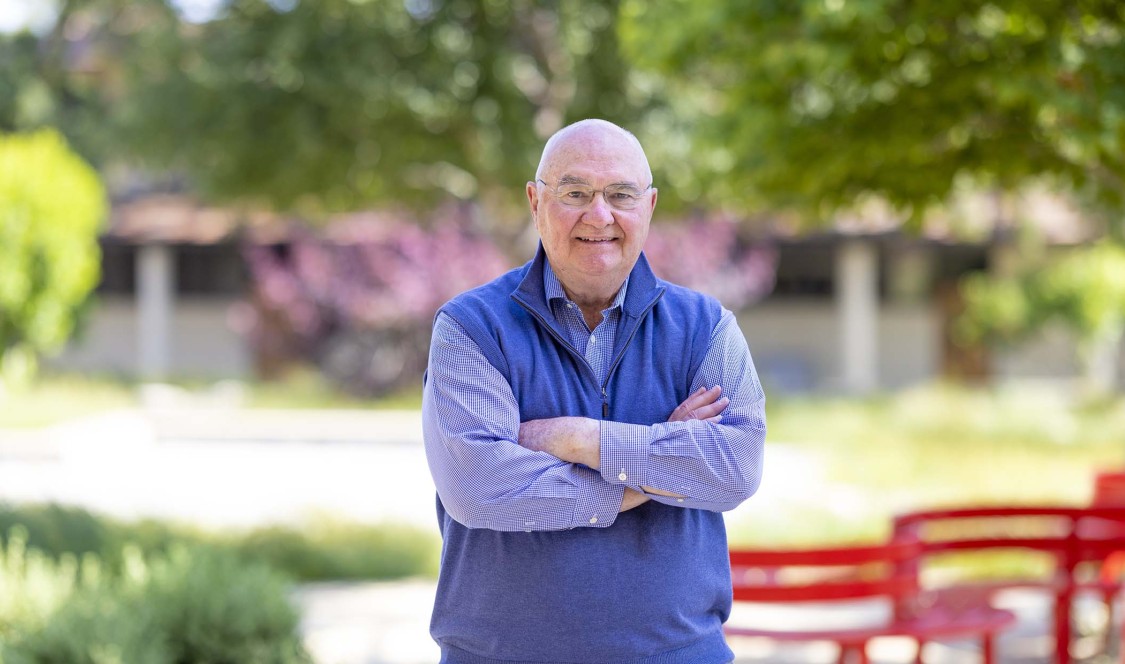Bill Baker ’63 P’89 owes his discovery of Claremont McKenna College to George C. S. Benson P'61, CMC’s founding president.
Baker transferred to CMC from Deep Springs College, benefiting from a partnership that Benson forged with the private two-year institution, which is based on a remote cattle ranch in eastern California. “Benson had visited the school and was impressed,” Baker explained.
One of his professors at Deep Springs suggested he apply to CMC, Baker recalled. “He said, ‘This is a great opportunity at a great school.’ He urged me to look into it and I applied and got a tuition scholarship.”
Baker headed for Claremont, spending 1961-1963 at CMC, earning a BS in Political Science and Government. “I was the guy from Deep Springs, so Benson kept an eye on me.”
Beginning in 1971, after stints with Pacific Telephone and in the Coast Guard, Baker built a career in the software industry. He retired after 32 years of leadership roles with IBM, Control Data Corporation, and Quorum Systems before founding Baker Cadence Solutions in 2000, where he still works.
Baker, whose son Chris graduated from CMC in 1989, shared some of his favorite CMC moments and lessons learned.
How did your time at CMC prepare you for your career?
Having to write essays and a senior thesis was at the time a pain, but it really prepared me for being able to write in corporate positions, I found that some of my peers couldn’t write or didn’t want to write, which was a weakness. And, and I think my writing skills were one of the reasons why I was promoted through IBM and then through Control Data.
Did you have any mentors at CMC?
Government Professor Martin Diamond, one of the top professors in the country, was my mentor. (TIME magazine featured Diamond on its cover in 1966, when the publication named him to their ‘Top 10 Great Teachers at U.S. colleges and universities’ list.)
He really impressed me and taught us about how the Founding Fathers wrote the Constitution. It’s a lesson that stays with me forever. I still do a lot of reading about the Founding Fathers and the Constitution. I think I learned a lot from Dr. Diamond.
At the time, I intended to go to law school, and he wrote letters for me. And I think it helped me to get accepted to those schools. I was closer to him than any of my other professors.
I have a story about him. I said, ‘Dr. Diamond, how can I get an A?’ He was giving me a lot of Bs. He said, ‘Mr. Baker, you are a B student in this class. There are some brilliant people and they’re going to get A’s and you’re going to get B’s or B pluses. Just understand that’s the way it is.’ And I accepted that from Dr. Diamond, but still graduated with honors, cum laude.
What were some of your favorite CMC experiences?
Going to Story House to have our meals, and to sit down in a communal place, and talk. That was great. And the conversations were more academic and many times, we were talking about government and politics, and things that were going on. It was a good dialogue that made you want to think about your own views.
I made some good friends living in Boswell, and one of them is still one of my very best friends, John Wells ’63. Also, there was General Bill Crouch ’63 (a retired commander of NATO Land Forces in Central Europe [LANDCENT] who currently serves on the Keck Center for International and Strategic Studies’ Board of Governors.) Another one who is still a very good friend is Doug Stewart ’62, who became a movie writer. He wrote An Officer and a Gentleman. And Joe Battaglia ’63, who passed away just a couple of years ago. He was the president of the student body.
I couldn’t hide because it was such a small school, and that forced me to do things socially. Then there were all the different opportunities to get involved. Joe got me on the student council. Once he was president, I became the PR director promoting all the events
How did your senior thesis impact you?
I chose to do an honors thesis, which was over two semesters—the full year—which is a big risk. But I wrote it for a professor at Claremont Graduate University. And it was a different kind of deal where you just didn’t submit the paper, you had to appear in front of a panel of other professors and answer questions and so on. And it was about the history of lobbying in the state of California.
I got an A.
I have a trunk in the garage that I’ve had with me when I moved to CMC in 1961. I opened it the other day, and there was my senior thesis!
Why is it important for you to be involved at CMC and/or give back?
I do give every year and have gone back to CMC for my reunions. The last one (in summer 2023) was really impressive. The new buildings and the growth that CMC has planned, and that is underway, are going to have a huge impact.
I counsel people about schools, and I say try to go to a small school like Claremont McKenna. One of my sons went to CMC, and graduated in 1989. He developed socially and that’s helped him in his career.
I was really impressed that CMC was named by The Wall Street Journal as a top college in the nation for preparing students for employment following graduation. One of the rankings was how quickly CMC graduates can pay off their cost of education. I was so proud of that.

